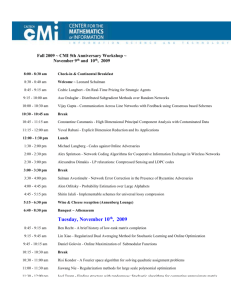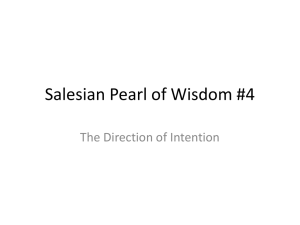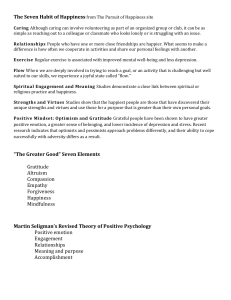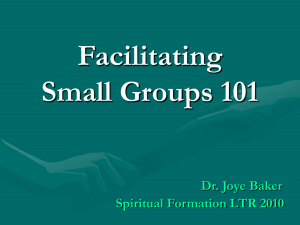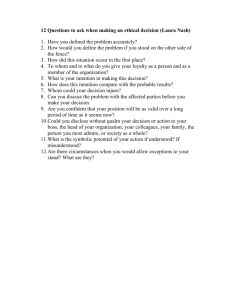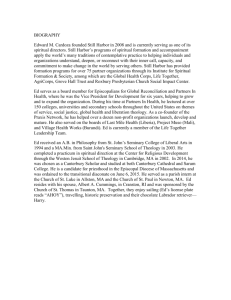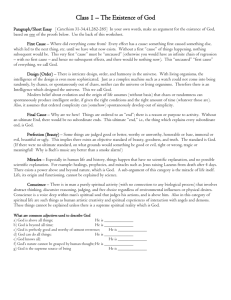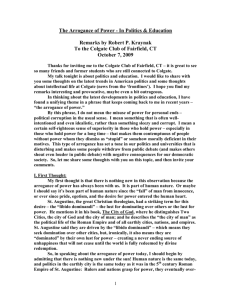The Twelve Principles of Spiritual Leadership
advertisement
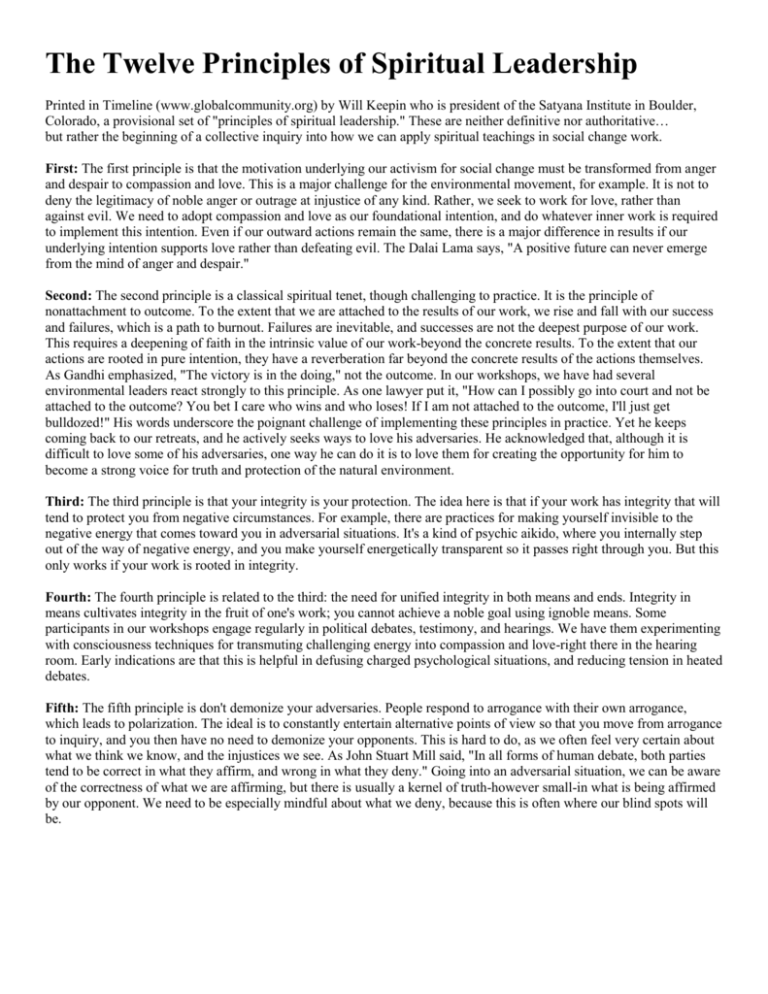
The Twelve Principles of Spiritual Leadership Printed in Timeline (www.globalcommunity.org) by Will Keepin who is president of the Satyana Institute in Boulder, Colorado, a provisional set of "principles of spiritual leadership." These are neither definitive nor authoritative… but rather the beginning of a collective inquiry into how we can apply spiritual teachings in social change work. First: The first principle is that the motivation underlying our activism for social change must be transformed from anger and despair to compassion and love. This is a major challenge for the environmental movement, for example. It is not to deny the legitimacy of noble anger or outrage at injustice of any kind. Rather, we seek to work for love, rather than against evil. We need to adopt compassion and love as our foundational intention, and do whatever inner work is required to implement this intention. Even if our outward actions remain the same, there is a major difference in results if our underlying intention supports love rather than defeating evil. The Dalai Lama says, "A positive future can never emerge from the mind of anger and despair." Second: The second principle is a classical spiritual tenet, though challenging to practice. It is the principle of nonattachment to outcome. To the extent that we are attached to the results of our work, we rise and fall with our success and failures, which is a path to burnout. Failures are inevitable, and successes are not the deepest purpose of our work. This requires a deepening of faith in the intrinsic value of our work-beyond the concrete results. To the extent that our actions are rooted in pure intention, they have a reverberation far beyond the concrete results of the actions themselves. As Gandhi emphasized, "The victory is in the doing," not the outcome. In our workshops, we have had several environmental leaders react strongly to this principle. As one lawyer put it, "How can I possibly go into court and not be attached to the outcome? You bet I care who wins and who loses! If I am not attached to the outcome, I'll just get bulldozed!" His words underscore the poignant challenge of implementing these principles in practice. Yet he keeps coming back to our retreats, and he actively seeks ways to love his adversaries. He acknowledged that, although it is difficult to love some of his adversaries, one way he can do it is to love them for creating the opportunity for him to become a strong voice for truth and protection of the natural environment. Third: The third principle is that your integrity is your protection. The idea here is that if your work has integrity that will tend to protect you from negative circumstances. For example, there are practices for making yourself invisible to the negative energy that comes toward you in adversarial situations. It's a kind of psychic aikido, where you internally step out of the way of negative energy, and you make yourself energetically transparent so it passes right through you. But this only works if your work is rooted in integrity. Fourth: The fourth principle is related to the third: the need for unified integrity in both means and ends. Integrity in means cultivates integrity in the fruit of one's work; you cannot achieve a noble goal using ignoble means. Some participants in our workshops engage regularly in political debates, testimony, and hearings. We have them experimenting with consciousness techniques for transmuting challenging energy into compassion and love-right there in the hearing room. Early indications are that this is helpful in defusing charged psychological situations, and reducing tension in heated debates. Fifth: The fifth principle is don't demonize your adversaries. People respond to arrogance with their own arrogance, which leads to polarization. The ideal is to constantly entertain alternative points of view so that you move from arrogance to inquiry, and you then have no need to demonize your opponents. This is hard to do, as we often feel very certain about what we think we know, and the injustices we see. As John Stuart Mill said, "In all forms of human debate, both parties tend to be correct in what they affirm, and wrong in what they deny." Going into an adversarial situation, we can be aware of the correctness of what we are affirming, but there is usually a kernel of truth-however small-in what is being affirmed by our opponent. We need to be especially mindful about what we deny, because this is often where our blind spots will be. Sixth: The sixth principle is to love thy enemy. Or if you can't do that, at least have compassion for them. This means moving from an "us-them" consciousness to a "we" consciousness. It means recognizing that I am the logger: when I write these principles of spiritual activism and publish them in this newsletter, I give the command to the logger to fell the trees, to produce the pulp, to produce this paper so that I can publish these spiritual principles about how best to save the trees. It is seeing the full circle of our interconnected complicity, and discovering all the problems of humanity in our own hearts and our own lives. We are not exempt and we are not different. The "them" that we speak of is also us. The practice of loving our adversaries is obviously challenging in situations with people whose views and methodologies are radically opposed to ours, but that is where the real growth occurs. Seventh: The seventh and eighth principles are a bit contradictory. The seventh is that your work is for the world rather than for you. We serve on behalf of others and not for our own satisfaction or benefit. We're sowing seeds for a cherished vision to become a future reality, and our fulfillment comes from the privilege of being able to do this work. This is the traditional understanding of selfless service. Eighth: But then the eighth principle is that selfless service is a myth. Because in truly serving others, we are also served. In giving we receive. This is important to recognize as well, so we don't fall into the trap of pretentious service to others' needs and develop a false sense of selflessness or martyrdom. Ninth: The ninth principle is: do not insulate yourself from the pain of the world. We must allow our hearts to be brokenbroken open-by the pain of the world. As that happens, as we let that pain in, we become the vehicles for transformation. If we block the pain, we are actually preventing our own participation in the world's attempt to heal itself. As we allow our hearts to break open, the pain that comes is the medicine by which the Earth heals itself, and we become the agents of that healing. This is a vital principle that is quite alien to our usual Western ways of thinking. Tenth: The tenth principle is: what you attend to, you become. If you constantly attend to battles, you become embattled. On the other hand, if you constantly give love, you become loving. We must choose wisely what we attend to, because it shapes and defines us deeply. Eleventh: The eleventh principle is to rely on faith. This is not some Pollyannaish naiveté, as many "realists" would interpret it. Rather it entails cultivating a deep trust in the unknown, recognizing the presence of "higher" or "divine" forces at work that we can trust completely without knowing their precise agendas or workings. It means invoking something beyond the traditional scientific worldview. It implies that there are invisible forces that we can draw upon and engage, firstly by knowing they are there; secondly, by asking or yearning for them to support us-or more precisely, asking them to allow us to serve on their behalf. Faith is understood not as blind adherence to any set of beliefs, but as a knowing from experience and intuition about intrinsic universal principles beyond our direct observation, and relying upon these principles, whatever they are, to support us in creating what we aspire to create. This actually brings great relief when we realize it really isn't up to us to figure out all the steps to manifest our unfolding vision, because we are participants in a larger cosmic will. Nevertheless, it is our job to discover what our unique gift is- our unique role-and for each person to give their gift as skillfully and generously as possible, while trusting that the rest will all work itself out. Twelfth: Finally, the twelfth principle is that love creates the form. As Stephen Levine says, "The heart crosses the abyss that the mind creates." It is the mind that gives rise to the apparent fragmentation of the world, while the heart can operate at depths unknown to the mind. So, if we begin imagining with our hearts, and work from a place of yearning as well as thinking, then we develop an unprecedented effectiveness that is beyond our normal ways of understanding because it doesn't have to do with thinking. When we bring the fullness of our humanity to our leadership, we can be far more effective in creating the future we want. In closing, as we enter the third millennium, we are urgently called to action in two distinct capacities: to serve as hospice workers to a dying culture, and to serve as midwives to an emerging culture. These two tasks are required simultaneously; they call upon us to move through the world with an open heart-meaning we are present for the grief and the pain-as we experiment with new visions and forms for the future. Both are needed. The key is to root our actions in both intelligence and compassion-a balance of head and heart that combines the finest human qualities in our leadership for cultural transformation. Adapted from a presentation at Schumacher College, Totnes, England by Will Keepin of the Satyana Institute, Boulder Colorado

